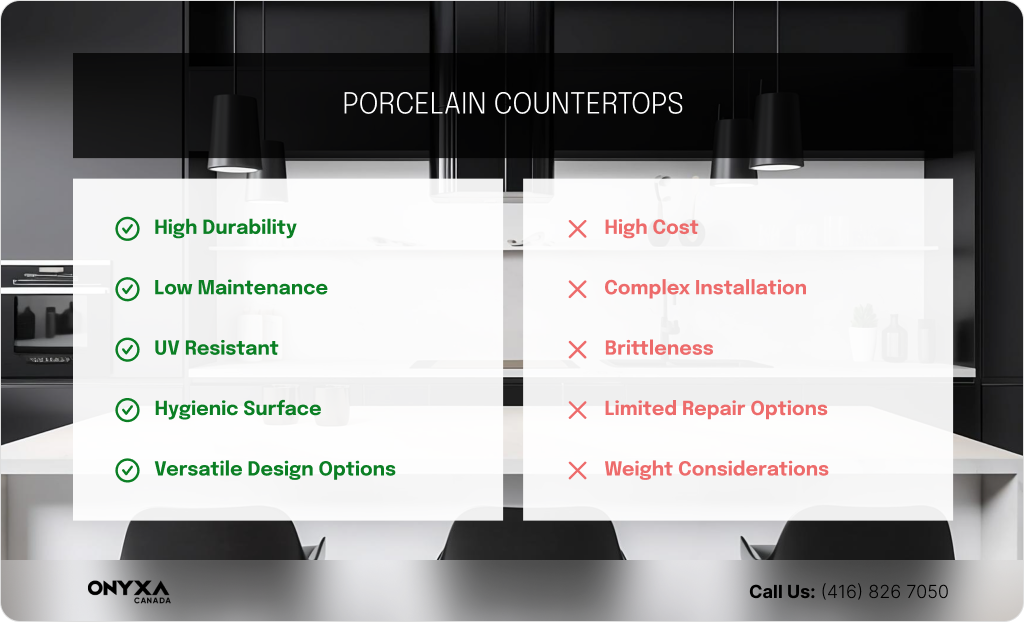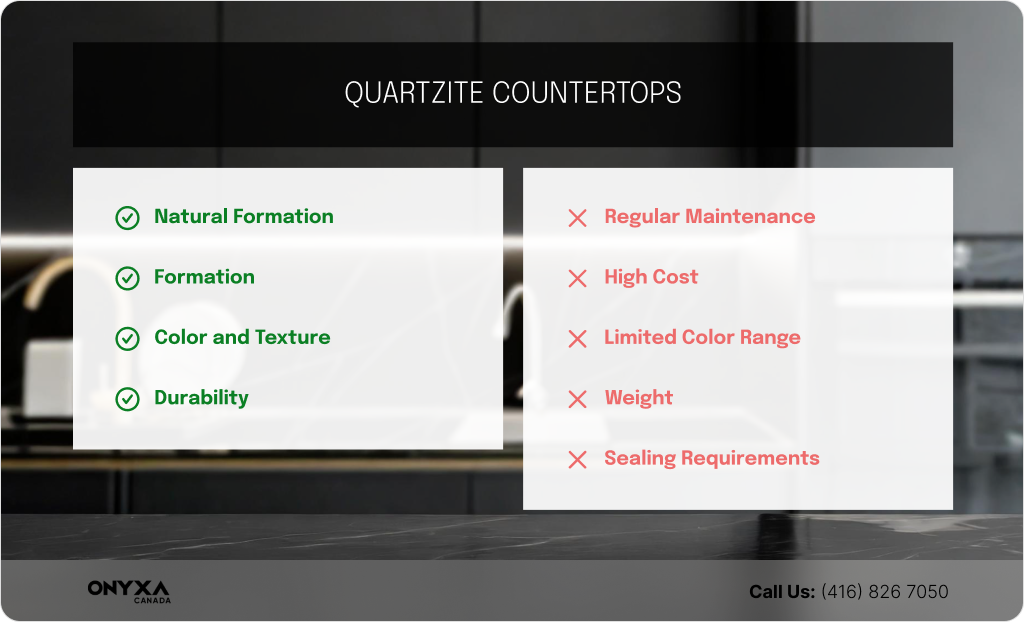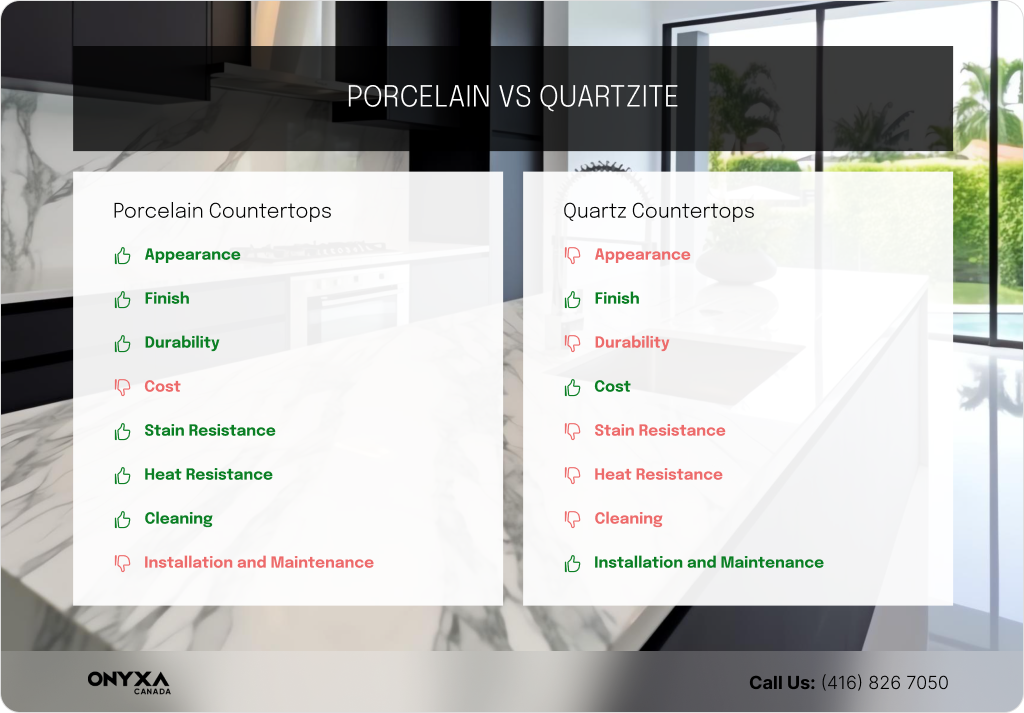Porcelain Countertops vs Quartzite: Which is Best for You in 2024
In the ever-evolving world of home design, choosing the right countertop material is a crucial decision for any kitchen or bathroom renovation. As we head into 2024, porcelain and quartzite countertops continue to dominate the market, each offering unique benefits and aesthetic appeals. This comprehensive guide will delve into the pros and cons, cost comparisons, and other essential factors to consider between porcelain and quartzite, helping you make an informed choice that fits your lifestyle and enhances your home’s décor.
What are Porcelain Countertops?
Porcelain countertops are crafted from a blend of clay, feldspar, silica, and mineral oxides, which are vitrified at temperatures over 1200 degrees Celsius to create a dense, durable surface.
This process allows for a wide range of designs and finishes, including natural stone, wood, and metal replicas, making porcelain a versatile choice in modern home design.
These countertops are aesthetically flexible and boast low maintenance requirements and high thermal shock and UV light resistance, making them suitable for various applications, including kitchens, bathrooms, and outdoor areas.
The combination of durability, design versatility, and environmental sustainability makes porcelain countertops a practical and popular choice for contemporary homes, aligning with both aesthetic preferences and functional needs.
Pros and Cons of Porcelain Countertops

Pros:
Durability
Porcelain countertops are highly resistant to scratches, chips, and extreme temperatures, making them ideal for high-traffic areas in homes. This material stands up well to wear and tear, ensuring longevity even in busy kitchens and bathrooms.
Low Maintenance
Thanks to its non-porous nature, porcelain is exceptionally easy to maintain. Spills and stains can be wiped away quickly without any risk of them seeping into the surface, eliminating the need for frequent deep cleaning or special treatments.
UV Resistance
Unlike some other countertop materials, porcelain does not fade over time. Its UV-resistant qualities ensure that the colors and patterns remain vibrant and unaffected by prolonged exposure to sunlight, making it suitable for rooms with lots of natural light or for outdoor kitchen areas.
Hygienic Surface
The non-porous surface of porcelain countertops does not harbor bacteria or viruses, making it a hygienic choice for kitchens. This attribute is particularly important for households focused on cleanliness and food safety.
Versatile Design Options
Porcelain offers a vast range of design options, with the ability to mimic the appearance of granite, marble, wood, and more. This versatility allows homeowners to achieve their desired aesthetic without compromising on the practical benefits of porcelain.
Cons:
Cost
While porcelain countertops are generally cost-effective, premium options featuring custom designs or larger slab sizes can be expensive. The initial cost may be higher than other materials, reflecting the sophisticated manufacturing process and the high-quality finishes available.
Complex Installation
Installing porcelain countertops requires professional expertise due to the material’s weight and the precision needed for proper fitting. This complexity can increase installation costs and may require more time to ensure everything is aligned perfectly and securely.
Brittleness
Despite its durability against scratches and heat, porcelain can be brittle, particularly if not installed correctly. This brittleness means that the edges and corners can chip if impacted by heavy objects, requiring careful handling during installation and use.
Limited Repair Options
If a porcelain countertop is damaged (e.g., a significant chip or crack), repair options are limited and often noticeable. In some cases, the entire section may need to be replaced, which can be costly and disruptive.
Weight Considerations
The heaviness of porcelain slabs can pose challenges during the installation process and may require reinforced cabinetry to support the weight, adding to the overall cost and complexity of installation.
What are Quartzite Countertops?

Quartzite countertops are formed from sandstone that undergoes a natural metamorphic process under intense heat and pressure, transforming it into a robust and durable natural stone.
This stone is highly prized for its unique beauty. It features various colors and striking veining that synthetic materials cannot exactly replicate.
Quartzite’s hardness makes it resistant to scratches and heat, making it ideal for high-use areas like kitchens. However, it does require periodic sealing to maintain its non-porous and stain-resistant properties. The natural origin of quartzite means it comes in a limited range of colors, mostly earth tones, which adds an exclusive and upscale feel to any interior space.
Its ability to withstand the elements also makes it suitable for outdoor installations. Despite its higher cost, quartzite’s durability, unique aesthetic appeal, and longevity make it a worthwhile investment for those looking to add natural elegance and functional value to their homes.
Pros and Cons of Quartzite Countertops
Pros:
Natural Formation and Characteristics
Quartzite originates from sandstone that has undergone a transformation deep within the earth under extreme heat and pressure. This process fuses the quartz grains together, creating a very hard and dense material.
Formation
Quartzite originates from sandstone that has undergone a transformation deep within the earth under extreme heat and pressure. This process fuses the quartz grains together, creating a very hard and dense material.
Color and Texture
Quartzite is typically available in shades ranging from white and gray to pink and red. Each slab features unique and striking veins and swirls, making it a standout choice for visual appeal in any setting.
Unique Beauty
Each quartzite slab is distinct, ensuring no two countertops are identical. This uniqueness provides a custom, upscale look that adds character and elegance to your space.
Extreme Durability
Quartzite is highly resistant to scratching and chipping, making it an excellent choice for surfaces in kitchens and bathrooms where durability is crucial.
Heat Resistance
The stone’s ability to withstand high temperatures makes it ideal for use in areas prone to heat exposure, such as around stoves and ovens, without the risk of damage.
Longevity
Due to its toughness, quartzite can last for decades, making it a worthwhile long-term investment for homeowners.
Low Porosity
Naturally low in porosity, quartzite, once sealed, offers excellent resistance to stains and bacteria, maintaining its pristine appearance with minimal effort.
Cons:
Regular Maintenance
Quartzite requires periodic sealing to preserve its beauty and functionality. This maintenance is essential to keeping its surface non-porous and preventing staining.
Cost
Quartzite can be more expensive than other countertop materials due to the rarity of certain variants and the complex quarrying process involved in its extraction.
Limited Color Range
While stunning, the color palette of quartzite is naturally limited to what is formed in the earth, which may not cater to all design preferences.
Weight
Quartzite’s density makes it quite heavy, which can complicate the installation process and may require additional structural support from cabinetry.
Sealing Requirements
Unlike some other stone options that might require less frequent sealing, quartzite’s need for regular sealing can be a drawback for those looking for lower-maintenance solutions
Porcelain Countertops vs Quartzite

If you’re considering updating your kitchen counters, you might consider porcelain or quartzite. Let’s break down what each option offers.
Porcelain is a smart pick if you want something low-maintenance. Thanks to its ability to mimic different materials, it comes in a wide array of designs. It’s also tough, resisting scratches and heat well.
Quartzite’s natural beauty adds charm. Every slab is uniquely patterned with vibrant colors, giving your space an elegant touch. While it’s just as durable as porcelain, it requires a bit more care, such as regular sealing, to keep it looking great and free from stains.
Appearance
If you compare the looks of porcelain and quartzite countertops, each has its own style. Porcelain is incredibly versatile. Thanks to advanced digital printing, it can look just like high-end materials like marble and granite, giving you many design choices for different decor styles. On the other hand, quartzite shines with its natural beauty. It has unique veining and earthy tones that bring a touch of luxury and authenticity to any space. While porcelain is flexible in design, the natural veining and rich colors of quartzite offer a sophisticated look that’s particularly prized in upscale design projects.
Finish
Porcelain and quartzite countertops are available in polished, honed, and matte finishes, each tailored to different design preferences. The porcelain’s polished finish is shiny, making its patterns vibrant, while the honed finish gives a subtle, matte appearance that reduces glare. Quartzite’s polished finish accentuates the stone’s natural colors and veining for a luxurious look, and its honed and matte finishes offer a softer, more natural vibe, perfect for a low-key, elegant style. These finishes help both materials adapt beautifully to various decor themes.
Durability
Durability is essential for countertops, especially in busy kitchens. Quartzite is incredibly tough, resisting scratches and heat, making it perfect for kitchen use. Porcelain also handles heat and scratches well but adds UV light resistance, making it great for both indoor and outdoor spaces. Its low porosity prevents stains and moisture, simplifying maintenance and boosting longevity. Both materials are durable, but porcelain’s extra features offer versatility for various environments.
Porosity
When picking countertops, consider porosity since it influences stain resistance and upkeep. Porcelain countertops have a big advantage here—they’re non-porous, which means spills just sit on the surface and can be wiped away easily, no sealing necessary. Quartzite, while beautiful, does require regular sealing to protect against stains. So, if you’re looking for ease of maintenance, porcelain might just edge out as the better choice, subtly combining beauty with practicality.
Cost
When choosing new countertops, consider porcelain for both value and style. It’s more affordable than quartzite and offers a high-end look without the high cost. Porcelain is also easy to maintain, making it a great choice for busy kitchens and bathrooms. While quartzite is beautiful and durable, it’s pricier and needs more upkeep. For a stylish, durable, and budget-friendly option, porcelain is the way to go.
Stain Resistance
Stain resistance is important for keeping countertops looking fresh, and both porcelain and quartzite handle this well. Porcelain is particularly good because it’s non-porous, making spills easy to wipe up without special cleaners. Quartzite, though also stain-resistant, requires regular sealing to stay that way. So, for minimal upkeep and easy cleaning, porcelain is the smarter, more hassle-free choice for busy kitchens and bathrooms.
Heat Resistance
Heat resistance is important for kitchen countertops. While quartzite handles high temperatures very well, porcelain is also heat-resistant and a practical option. It’s smart to use trivets or hot pads with porcelain to ensure it stays looking great. This makes porcelain a versatile choice, combining good heat resistance with ease of maintenance and style.
Cleaning
When it comes to cleaning countertops, both porcelain and quartzite are easy to manage with just soap and water. However, porcelain has a clear advantage with its non-porous surface that resists bacteria and stains, making it incredibly easy to clean. This makes it an ideal choice for busy kitchens and bathrooms where quick, hassle-free cleaning is a must. Quartzite, while also easy to clean, requires a bit more care to maintain its sealant. If easy cleaning is a priority, porcelain is the way to go.
Installation and Maintenance
Which Countertop Material is Right for You? Porcelain vs Quartzite?
The choice between porcelain and quartzite countertops will ultimately depend on your specific needs, aesthetic preferences, and budget. Porcelain offers modern innovation, ease of maintenance, and versatility, while quartzite provides a timeless elegance and robust nature. Consider how the space will be used, what atmosphere you wish to create, and how much care you are willing to invest in maintaining the beauty of your countertops.
By weighing these factors, you can select the perfect countertop material that not only meets your practical needs but also complements your home’s style. Whether you choose the advanced technology of porcelain or the natural allure of quartzite, both options promise to enhance the beauty and functionality of your kitchen or bathroom for years to come.
